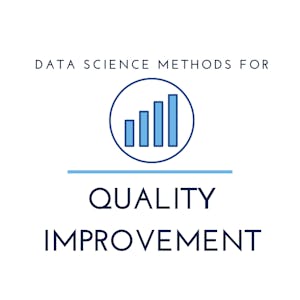Measurement Systems Analysis is a crucial course that delves into the analysis of measurement systems for process stability and capability. Through a series of modules, learners will gain in-depth knowledge on analyzing continuous and discrete measurement systems using statistical methods and R software. The course covers topics such as potential, short-term, and long-term studies, as well as assessing internal consistency and concordance with a standard for discrete measurement systems.
The curriculum emphasizes understanding the terms and concepts associated with measurement systems analysis, determining the potential capability of a measurement system, and assessing the short-term and long-term capability of a measurement system. Learners will acquire practical skills in evaluating measurement error, interpreting data visualizations, and making informed decisions for process improvement.
This course is ideal for individuals seeking to enhance their expertise in data science, statistics, and process improvement. Whether you are a professional or an aspiring data scientist, Measurement Systems Analysis equips you with the essential knowledge and practical skills to analyze and improve measurement systems effectively.
Certificate Available ✔
Get Started / More Info
The course is structured into modules covering correlation and association, analysis of variance, continuous data analysis, short-term and long-term studies, and discrete data analysis, providing a comprehensive understanding of measurement systems analysis.
Module 1: Correlation and Association
Explore the fundamental concepts of correlation and association, and gain proficiency in calculating the coefficient of correlation, measures of association, and conducting statistical tests for correlation using R software. This module provides the essential foundation for understanding the relationship between variables and their statistical significance.
Module 2: The One Way Analysis of Variance (ANOVA) for Fixed and Random Effects
Dive into the principles of analysis of variance, learning to perform one-way ANOVA for means and dispersion, as well as conducting post hoc analysis. Understand the importance of fixed and random effects in ANOVA and gain practical experience in performing ANOVA using RStudio, enabling you to analyze and interpret variance in data effectively.
Module 3: Introduction to Measurement Systems Analysis for Continuous Data, Potential Studies for Continuous Data
Delve into continuous measurement systems analysis, understanding the guidelines, sources of variation, and estimating variance from mean squares. Gain practical skills in data visualization and interpreting results to determine the potential capability of a measurement system, setting the stage for comprehensive analysis of continuous data.
Module 4: Short Term and Long Term Studies for Continuous Data
Learn to perform short-term and long-term measurement systems analysis, including testing assumptions, evaluating control, and interpreting measurement error. Gain insights into assessing control and error versus part size, and develop the ability to conduct comprehensive short and long-term studies for continuous data analysis.
Module 5: Measurement Systems Analysis for Discrete Data
Explore the terms and definitions of discrete measurement systems analysis, understanding concordance, internal consistency, and validity. Gain proficiency in performing discrete MSA procedures, agreement versus disagreement, and interpreting the Kappa statistic using practical examples, enabling you to assess and analyze discrete data effectively.
This course equips learners with the skills to plan, design, and analyze experiments effectively, using modern experimental strategies and data analysis techniques....
Bayesian Statistics: Techniques and Models offers an in-depth exploration of advanced Bayesian statistical models and computational techniques, providing learners...
Improving Your Statistical Inferences is a comprehensive course that equips learners with the knowledge and skills to enhance their statistical inferences, experimental...
Wrangling Data for Data Analysts with Python